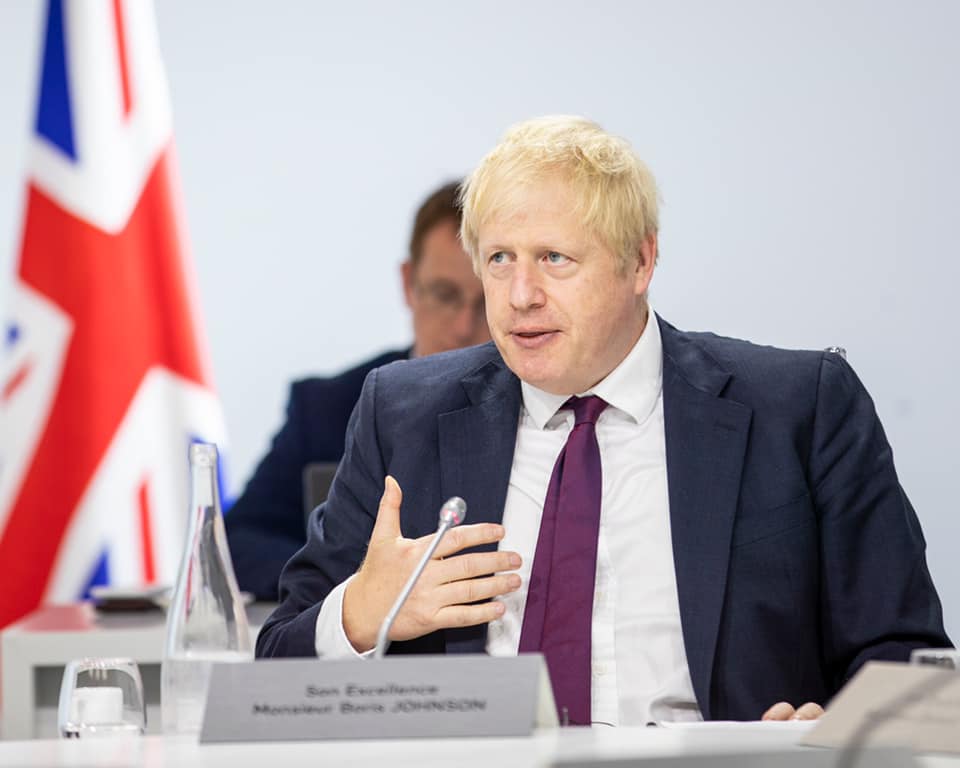
NEW YORK — Britain’s prime minister has promised to tell U.S. President Donald Trump that any notion of American firms buying parts of the U.K.’s beloved, state-funded health service will be off the table in future trade negotiations, and that the United States will have to open its markets to British goods if it wants to make a deal.
Boris Johnson said he would draw his red lines for the protectionist president when the two leaders meet this week at the United Nations General Assembly in New York. He also planned to tell U.S. business leaders and politicians that Britain will have a loosely regulated market “that is open to the world” after it leaves the European Union.
Johnson arrived at the global gathering on Monday with a balancing act to effect. He’s trying to persuade European Union leaders to strike an elusive divorce deal with Britain, while also laying the groundwork for a post-Brexit trade agreement with the United States — seen by the government as one of the main prizes of Brexit.
The Conservative prime minister is keen to forge a strong relationship with the Republican president, who has called the British leader “a really good man.”
But Johnson told reporters flying with him to New York that he would tell Trump “that when we do a free trade deal, we must make sure that the (National Health Service) is not on the table, that we do not in any way prejudice or jeopardize our standards on animal welfare and food hygiene in the course of that deal, and that we open up American markets.”
He also said the U.S. would have to accept British lamb and beef, which are barred, and lower tariffs on manufactured British goods.
Opponents of Brexit fear the NHS — an overstretched but much-loved institution founded in 1948 to provide free health care to all Britons — will be opened to private U.S. firms as part of trade negotiations. They also have suggested Britain may have to accept chlorine-washed chicken, a U.S. poultry industry practice that is banned in the European Union.
Johnson’s political opponents, and EU leaders, worry that post-Brexit Britain wants to become a low-tax, low-regulation economy — what some have dubbed a “Singapore on Thames.”
Johnson is likely to stir those fears Tuesday, when he plans to tell U.S. and Canadian business leaders the U.K. will “roll out the red carpet” for investors.
Johnson’s office said he would say that “we want a market that is open to the world, with the most competitive tax rates and the best skilled workforce in the hemisphere.”
Johnson is likely to be dogged by Britain’s divisive — and stalled — departure from the EU throughout his three-day trip to the U.N.’s annual gathering of world leaders.
More than three years after Britain voted to leave the EU, the departure date has been postponed twice, and the U.K. Parliament has repeatedly rejected the only divorce deal offered. The country is facing a chaotic exit on Oct. 31 unless Johnson’s government can, against the odds, secure a new agreement — or arrange another delay, something Johnson vows he will not do.
The British leader is seeking to persuade a skeptical European Union to give Britain a new divorce deal before the U.K. is due to leave the bloc on Oct. 31.
Johnson said he didn’t think there would be a “New York breakthrough” in meetings with European leaders at the U.N., but he was encouraged by the progress talks had made since he took office less than two months ago. He replaced Theresa May, who resigned in failure after her EU withdrawal agreement was rejected three times by Parliament.
“I think a large number of the important partners really do want a deal,” he said.
They may want a deal, but many leaders of the 28-nation bloc mistrust Johnson, a brash Brexit champion who played a big role in persuading British voters in 2016 to opt to leave the EU. And they say Britain has not come up with proposals for maintaining an open border between EU member Ireland and the U.K.’s Northern Ireland — the key sticking point in the dispute. An open border underpins both the local economy and the peace process that ended years of sectarian violence in Northern Ireland
Chief EU Brexit negotiator Michel Barnier said Monday that “based on current UK thinking, it is difficult to see how we can arrive at a legally operative solution.”
After meeting Johnson, European Council President Donald Tusk tweeted succinctly: “No breakthrough. No breakdown. No time to lose. #Brexit”
The U.K. says the border can be kept free of customs posts and other obstacles through a mix of as-yet unproven technology and an all-Ireland zone for animals and agricultural products.
“I think colleagues around the table in Brussels can see how we might do that,” Johnson said. “All it will take is a political will to get there.”
Johnson is also facing claims that during his tenure as mayor of London between 2008 and 2016, he gave public money and places on overseas U.K. trade trips to a close friend running a startup business.
He denied wrongdoing, saying Monday that “everything was done with complete propriety. Completely in the normal way.”
The British government is also bracing for a Supreme Court ruling on whether Johnson broke the law when he suspended Parliament for five weeks ahead of the Oct. 31 Brexit deadline.
Johnson says the suspension was a routine measure to prepare for a new session of Parliament. Opponents claim he acted illegally to stop lawmakers from interfering with his plan to leave the EU, with or without a Brexit deal.
The 11 justices say they will rule Tuesday morning. A ruling that the suspension was illegal would be a huge blow to Johnson’s authority and could see lawmakers recalled to Parliament immediately.
———
AP journalist Geir Moulson in Berlin contributed.